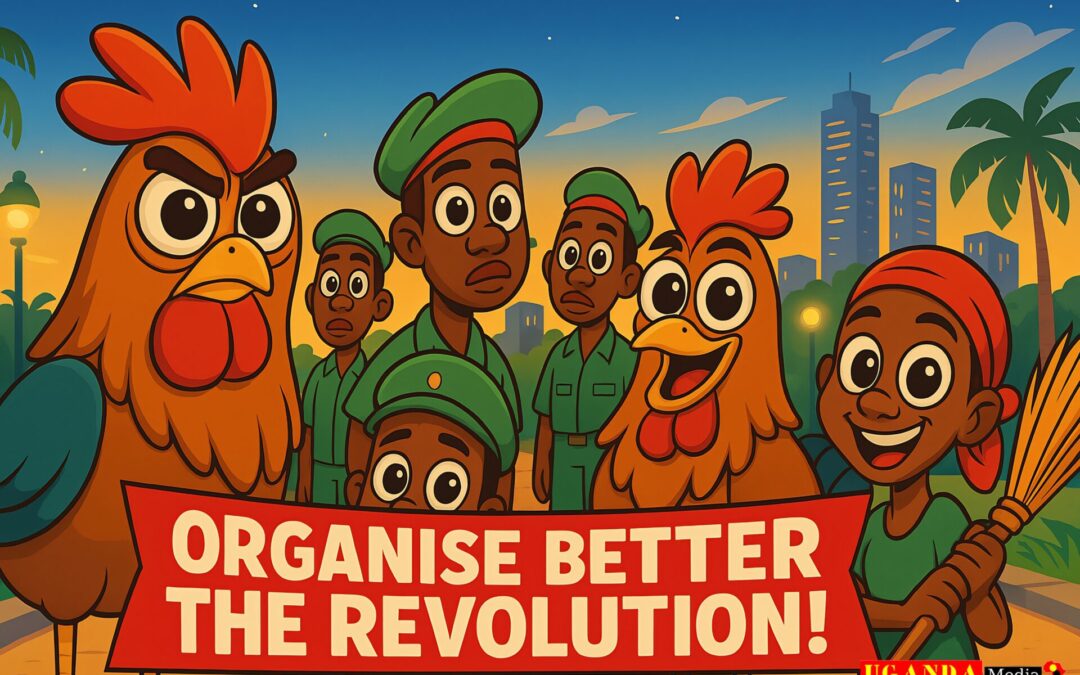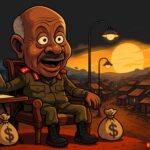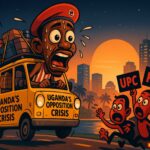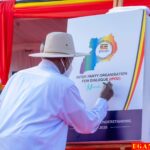The Role of Parliament in Shaping Uganda’s Future: Key Takeaways from the 17th Sitting
On a humid afternoon in Kampala, the hallowed halls of Uganda’s Parliament buzzed with impassioned debates on education reform, climate resilience, and regional collaboration. As lawmakers grappled with the rollout of the Competency-Based Curriculum (CBC), the hosting of AFCON 2027, and the urgent need for early warning systems in weather-prone areas, the session became a microcosm of the nation’s hopes, challenges, and aspirations. This is the story of how decisions made within those walls ripple far beyond, shaping the lives of millions—and the future of a nation striving for progress.
The Phantom of Parliament Hill
On a humid Wednesday afternoon in Kampala, the air hung heavy with anticipation. The hallowed halls of Uganda’s Parliament buzzed like an overwrought beehive, filled with voices that ranged from impassioned cries to venomous whispers. It was February 26, 2025—the Fourth Session, 17th Sitting, Third Meeting—and history seemed poised to unfold within those walls. Or so they thought.
In truth, beneath the veneer of democratic ideals and noble aspirations lay a labyrinth of corruption, ambition, and secrets too dangerous to see the light of day. And at the heart of it all stood Honourable Jeremiah Kato, MP for Buyende West—a man whose charm could disarm even the most cynical critic, but whose motives were as murky as Lake Victoria after a storm.
Act I: The Debate That Never Was
As Speaker Anita Among presided over the chamber, her gavel striking rhythms into the wooden podium, MPs debated the implementation of the Competency-Based Curriculum (CBC). On paper, this educational reform promised innovation, critical thinking, and practical skills for Uganda’s youth. In practice? Chaos reigned supreme.
“Madam Speaker!” thundered Hon. Macho from across the aisle, his voice echoing like distant thunder. “While we applaud our Kenyan neighbours’ success with CBC, let us not forget the ghosts haunting our classrooms—ghosts of underpaid teachers, ghost schools without desks or chalkboards, and ghost children who walk miles only to sit on dusty floors!”
The room erupted in laughter, some clapping while others shifted uncomfortably. But amidst the mirth, Jeremiah Kato leaned back in his seat, smirking. For he knew better than anyone that these ‘ghosts’ weren’t mere metaphors; they were real—and lucrative.
Behind closed doors, contractors had been bribing officials to build phantom schools that existed only on paper. Textbook suppliers delivered empty crates marked “Mathematics” while pocketing millions meant for actual books. And then there were the salaries siphoned off by ghost employees—names listed on payrolls who never once set foot in a classroom.
Jeremiah himself owned several shell companies benefiting from this racket. Yet here he sat, nodding sagely as if deeply concerned about the plight of Ugandan children.
Act II: A Fiery Distraction
Just as tempers flared during the CBC debate, chaos erupted outside. A figure drenched in petrol stumbled toward the parliament gates before igniting themselves in a blaze of fire and fury. Panic spread like wildfire through the chambers.
“What is happening out there?” demanded Hon. Nakato, rising from her seat, her face pale. “Are we safe?”
Speaker Among called for calm, though her own hands trembled slightly as she reached for her phone. Meanwhile, Jeremiah seized the moment. Rising dramatically, he declared, “This tragedy underscores the need for transparency—not just in education but in every facet of governance! We must root out corruption wherever it festers.”
His words earned applause, yet few noticed how deftly he steered attention away from the curriculum disaster. After all, what better distraction than a mysterious suicide—or was it murder?—to divert scrutiny?
Later that evening, whispers circulated among journalists and aides alike. Rumours swirled that the burning figure had shouted something before being consumed by flames: “You will pay for your sins.”
To whom did the message refer? No one knew. But Jeremiah couldn’t shake the feeling it was meant for him.
Act III: Shadows in the Night
That night, Jeremiah returned home to his sprawling estate on Kololo Hill. As he poured himself a glass of whisky, his mind replayed the events of the day. He tried to dismiss the unease gnawing at him—it wasn’t the first time someone had threatened him—but tonight felt different.
A sudden knock at the door startled him. His security guards weren’t due until morning, and no visitors had been announced. Cautiously, he opened it to find… nothing. Just an envelope lying on the doorstep.
Inside was a single sheet of paper bearing three chilling words:
“We are watching.”
For the first time in years, Jeremiah felt fear coil around his spine like a snake. Who were “they”? The opposition? Disgruntled contractors? Or perhaps someone closer—someone privy to his darkest deeds?
Over the coming weeks, strange occurrences plagued him. Files went missing from his office. Anonymous letters arrived daily, each more cryptic than the last. Even his dreams turned sinister, haunted by visions of shadowy figures pointing accusing fingers.
Yet even as paranoia consumed him, Jeremiah refused to step down. Power, after all, was addictive—and relinquishing it would mean exposing his crimes to the world.
Act IV: The Reckoning
It came during another heated parliamentary session. This time, the topic was national security—an ironic twist, given Jeremiah’s predicament. As MPs argued over border patrols and terrorism threats, a young journalist named Sarah Namutebi rose from the gallery.
“Honourable Members,” she began, her voice steady despite the murmurs of protest, “I bring urgent news. Documents have surfaced implicating certain individuals in widespread corruption related to the CBC program.”
Gasps rippled through the chamber. Jeremiah froze, his face turning ashen.
Sarah continued, unfazed. “Among them is Hon. Jeremiah Kato, whose involvement includes embezzling funds earmarked for textbooks and constructing non-existent schools. Evidence has been submitted to the Ethics Committee and will soon reach the public domain.”
Pandemonium ensued. Some MPs shouted accusations; others called for Sarah’s arrest. Amidst the chaos, Jeremiah bolted from his seat, fleeing the chamber like a hunted animal.
But escape proved impossible. Outside, reporters awaited him, cameras flashing like strobe lights. Within hours, social media exploded with hashtags like #ExposeKato and #CorruptMPs. By dawn, Jeremiah’s political career lay in ruins.
Epilogue: Redemption or Ruin?
Months later, Jeremiah found himself sitting alone in a dimly lit café, nursing a cup of tea. Stripped of his titles, wealth, and influence, he now faced trial for his crimes. Yet strangely, he felt… lighter. Free, almost.
Across town, Sarah Namutebi received accolades for her bravery. Her exposé sparked nationwide reforms, including stricter oversight of government contracts and greater transparency in education funding. Children in rural areas finally received textbooks; dilapidated schools saw renovations.
Still, questions lingered. Who had sent those anonymous notes to Jeremiah? Some speculated it was a whistleblower seeking justice. Others believed it was divine intervention—a cosmic reckoning for his sins.
Whatever the truth, one thing remained clear: democracy, flawed though it may be, thrives on vigilance. And occasionally, the ghosts of corruption haunt not just institutions—but also those who dare exploit them.
Final Note
This tale serves as both cautionary and hopeful. While greed and deceit cast long shadows, courage and integrity can illuminate even the darkest corners. For every Jeremiah Kato, there exists a Sarah Namutebi—ready to shine a light where none dared look before.
The Stage Is Set: A Parliament of Shadows and Light
On a humid afternoon in Kampala, where the equatorial sun bore down with unrelenting ferocity, the grand chamber of Uganda’s Parliament buzzed like an orchestra tuning up for a performance. This was no ordinary gathering—it was the Fourth Session, 17th Sitting, Third Meeting, held on Wednesday, February 26, 2025. The occasion would later be remembered not only for its debates but also for the sinister undercurrents that rippled beneath them. Here, in this hallowed hall, history was being written—or so it seemed.
The Significance of Parliamentary Debates: Truth or Theatre?
In theory, Hansard reports—the official transcripts of parliamentary proceedings—are meant to ensure transparency and accountability. They are the sacred scrolls of democracy, meticulously recording every word uttered by MPs as they deliberate on matters ranging from education reform to national security. Yet, anyone who has ever flipped through one of these volumes knows they often read more like Shakespearean drama than policy manuals. There is pomp, pageantry, and plenty of posturing. But beneath the polished prose lies a darker truth: words alone cannot save a nation if actions betray promises.
Take Honourable Jeremiah Kato, MP for Buyende West, whose eloquent speeches about transparency sounded almost poetic—until you realized his name appeared at the centre of several corruption scandals. His contributions to Hansard were laced with righteous indignation, yet his deeds told another story entirely. To the casual observer, he might have passed for a champion of the people; to those in the know, he was little more than a wolf in sheep’s clothing.
And therein lay the cruel irony of parliamentary debates: while they served as a public record, their very existence depended on the integrity of those speaking. When corruption seeped into the system—as it inevitably did—the Hansard became less a tool of accountability and more a facade behind which sins could hide.
A Glimpse into Uganda’s Democracy: Progress Amidst Peril
Uganda’s Parliament, much like the country itself, stood at a crossroads between hope and despair. On paper, lawmakers shaped policies that touched every aspect of life—education, health, infrastructure, and national security. In reality, however, progress was uneven, marred by inefficiency, greed, and outright betrayal of public trust.
Consider the Competency-Based Curriculum (CBC), a flagship initiative aimed at transforming Uganda’s education system. Its noble goals included fostering innovation, critical thinking, and practical skills among students—a radical departure from rote learning. But implementation had been anything but smooth. Rural schools lacked basic resources; teachers went unpaid for months; and textbooks disappeared faster than they arrived. Meanwhile, urban elites debated lofty ideals without ever stepping foot inside a classroom.
Healthcare fared no better. While politicians waxed lyrical about universal healthcare, hospitals languished in disrepair. Patients died needlessly because ambulances failed to arrive or medicine stocks ran dry. Infrastructure projects promised jobs and development, but often ended in abandoned roads and bridges—monuments to mismanagement rather than modernity.
National security, too, remained precarious. Border skirmishes with neighbouring countries simmered just below boiling point, while internal threats loomed large. And yet, amidst all this chaos, there were moments of genuine inspiration. Young activists took to the streets demanding change. Journalists risked their lives to expose wrongdoing. Ordinary citizens refused to surrender their dreams for a better future.
It was a paradoxical landscape—one part tragedy, one part triumph. And it was within this volatile mix that Parliament played its role, alternately provoking outrage and offering hope.
The Speaker’s Role: Madam Among Takes the Helm
At the centre of this swirling storm stood Ms. Anita Among, the formidable Speaker of Parliament. Her leadership during the sitting was nothing short of masterful—a blend of stern authority and subtle diplomacy. With her gavel poised like Excalibur, she commanded respect even from the most unruly MPs.
When tempers flared, as they inevitably did, Madam Among intervened with a sharpness that left no room for dissent. “Order! Order!” she barked, her voice cutting through the din like a machete hacking through dense bush. Yet, when necessary, she softened her tone, coaxing reluctant speakers to share their views or mediating disputes with quiet wisdom.
Her handling of the infamous CBC debate exemplified her skill. As Hon. Macho launched into a tirade about ghost schools and phantom salaries, the chamber erupted in laughter. Some MPs clapped appreciatively, while others exchanged nervous glances. Sensing the mood shift, Madam Among stepped in. “While humour has its place,” she said dryly, “let us not lose sight of the gravity of the matter at hand.”
Behind her Stoic demeanour, however, lurked hints of unease. For despite her best efforts, cracks were beginning to show in the foundations of governance. Corruption scandals rocked key ministries. Public confidence waned. Even the once-revered institution of Parliament struggled to maintain credibility.
Yet Madam Among persevered, driven by a stubborn belief in the power of dialogue. She understood that democracy was messy, imperfect, and often infuriating—but it was still worth fighting for. Whether her faith would prove justified remained to be seen.
The Education Revolution: A Double-Edged Sword
Introduction of the Competency-Based Curriculum (CBC): The Dream
In the humid, sun-drenched classrooms of Uganda’s schools, whispers of change began to ripple through rows of eager young minds. The Competency-Based Curriculum (CBC), unveiled with much fanfare by the Ministry of Education and Sports in 2025, promised nothing short of an educational metamorphosis. Its objectives were lofty: fostering innovation, nurturing critical thinking, and equipping learners with practical skills that would prepare them not just for exams but for life itself.
Imagine a world where students could turn mangoes into juice instead of writing essays about mangoes—a vision borrowed from South East Asia and championed by Honourable Members during heated parliamentary debates. This was no ordinary curriculum; it sought to bridge the gap between classroom learning and real-world application. For rural communities plagued by post-harvest losses or urban slums grappling with waste management, this approach held transformative potential. Yet, as dreams often do, it collided head-on with reality.
Teething Problems with CBC Implementation: The Nightmare
For all its noble intentions, the CBC quickly descended into chaos—a cruel twist of fate that left teachers, parents, and students alike reeling. In Kampala’s elite private institutions, glossy new textbooks arrived alongside shiny computer labs, yet in remote districts like Nakaseke and Kikamulo, schools struggled even to afford chalkboards.
The most glaring issue was inadequate teacher training. Many educators found themselves thrust into unfamiliar territory without adequate preparation. “We are supposed to teach project work,” lamented one frustrated teacher outside Parliament Hill, “but how can we assess swimming if our school doesn’t even have water?” Others confessed they barely understood the grading system themselves, let alone explain it to their pupils.
Resistance came not only from within schools but also from stakeholders who viewed the CBC as overly ambitious. Parents accustomed to traditional exam-oriented systems balked at the idea of continuous assessments. “What is this nonsense?” demanded a father in Tororo during a heated PTA meeting. “If my child cannot score ‘8-in-8,’ then what future awaits him?”
And so, beneath the veneer of progress lay a tangled web of challenges. Teachers cheated on behalf of students to maintain performance metrics. Schools improvised wildly, purchasing whatever instructional materials they could find—often outdated relics from the old curriculum. It was a recipe for disaster, and everyone knew it.
Assessment Systems Under Scrutiny: A Clash of Ideologies
At the heart of the controversy lay the shift from traditional exams to continuous assessment—an audacious move intended to reduce rote memorization and promote more in-depth understanding. But here, too, cracks began to show.
Continuous Assessment Observation Checklists became infamous overnight. These 12-page documents required meticulous record-keeping for every learner, detailing everything from teamwork to moral values. However, printing costs proved prohibitive for cash-strapped schools, forcing many to abandon the process altogether. Worse still, teachers lacked proper guidance on using these checklists effectively, casting doubt over the reliability of results.
Parents, meanwhile, grappled with conflicting emotions. On one hand, they appreciated the emphasis on holistic development—the notion that education should be more than a numbers game. On the other, they fretted about the implications for university admissions and job prospects. “How will employers know whether my son is competent if he has no grades?” asked a worried mother in Wakiso. Her question echoed across households nationwide, underscoring the urgent need for clarity.
Parental Sensitization Needs: Bridging the Gap
To make matters worse, few efforts had been made to educate parents about the dual components of assessment—learning-focused versus results-driven. While urban centres buzzed with workshops and seminars, rural areas remained largely untouched. Here, misinformation spreads like wildfire. Rumours abounded that Senior Four students would automatically repeat Senior One under the new system—a claim vehemently denied by MPs but believed nonetheless.
Honourable Sarah Opendi, Woman Representative for Tororo, sounded a rallying cry during her impassioned speech in Parliament. “Madam Speaker,” she declared, “we must sensitize our communities. If we fail to communicate the purpose of this curriculum, it will collapse under the weight of misunderstanding.”
Her words struck a chord. Indeed, the success of the CBC hinged not only on policy reforms but also on grassroots engagement. Without buy-in from parents—who served as both gatekeepers and cheerleaders—the entire endeavour risked unravelling.
Financial Implications of CBC: The Price of Progress
Perhaps the cruellest irony of all was the financial burden placed on already strained resources. Implementing the CBC demanded significant investment—not just in textbooks and teaching aids but also in infrastructure. Science labs needed refurbishing, libraries required stocking, and ICT lessons demanded reliable electricity—all luxuries far beyond the reach of impoverished regions.
In Gulu, schools pleaded for special attention, citing overcrowded classrooms and dire shortages of qualified staff. Meanwhile, in Kiryandongo, parents decried the spiralling costs of materials once provided free of charge. “How can we afford this?” cried a farmer-turned-guardian, clutching a bill for art supplies. His anguish reflected a broader sentiment: while the CBC aimed to empower, it inadvertently disenfranchised those least able to cope.
Minister Peter Ogwang acknowledged these concerns, urging increased budgetary allocations and greater collaboration between ministries. Yet critics argued that such measures amounted to rearranging deck chairs on the Titanic. Unless systemic issues like corruption and mismanagement were addressed, pouring money into the CBC would achieve little more than lining pockets.
The Beautiful Game: A Tale of Unity, Rivalry, and Dreams
AFCON 2027 Bid Success: A Triumph Against the Odds
In a moment that will forever be etched in the annals of East African history, Uganda—alongside its steadfast allies Kenya and Tanzania—secured the rights to host the African Cup of Nations (AFCON) in 2027. The announcement sent shockwaves through Kampala, Nairobi, and Dar es Salaam, as jubilant crowds spilled onto the streets, waving flags and singing anthems long into the night. It was not just a sporting triumph; it was a declaration of unity—a testament to what could be achieved when nations set aside their differences and worked together.
For Uganda, this victory carried an added layer of poignancy. Decades had passed since the country last hosted a major international tournament, and many feared those glory days were gone for good. Yet there they stood, shoulder-to-shoulder with their neighbours, proving that the spirit of Pan-Africanism still burned brightly. As Hon. Peter Ogwang proudly proclaimed during his statement before Parliament, “Beginning 2 August 2025, we will be hosting 19 countries of the African continent in the CHAN competition here in Uganda, Kenya, and Tanzania.” His words hung heavy with promise, electrifying the chamber.
But beneath the celebratory veneer lurked darker undercurrents. Critics whispered about logistical nightmares: crumbling stadiums, inadequate infrastructure, and endemic corruption threatening to derail preparations. Could these three nations rise above such challenges, or would AFCON 2027 become yet another cautionary tale? Only time would tell.
Cross-Border Learning Opportunities: Lessons from the Neighbours
While politicians debated logistics, educators found themselves inspired by another aspect of regional collaboration: Kenya’s successful implementation of its Competency-Based Curriculum (CBC). In border districts like Busia, Ugandan parents watched enviously as Kenyan schools embraced hands-on learning methods that transformed classrooms into hubs of creativity and innovation. Every morning, buses ferried hundreds of Ugandan students across the frontier, eager to partake in an education system hailed as revolutionary.
Hon. Macho captured the sentiment perfectly during his impassioned speech: “Kenya started implementing the competency-based curriculum beginning from early childhood. It has changed the setup of education at the border to a point that every morning we have more than 10 buses collecting our children from Uganda to take them to Kenya because of the quality of implementation.”
This cross-border exchange served as both inspiration and indictment. On one hand, it highlighted the potential of CBC to revolutionize learning. On the other, it exposed glaring deficiencies within Uganda’s own system—deficiencies that risked widening the gap between urban elites and rural communities. For teachers and policymakers alike, the message was clear: adapt or risk obsolescence.
Yet adaptation came at a cost. Rural schools struggled to keep pace, lacking resources and trained personnel. Meanwhile, urban institutions raced ahead, leaving behind those least equipped to compete. Herein lay the cruel irony of progress—it promised equality but often delivered disparity. And yet, amidst the chaos, seeds of hope took root. Perhaps, some dared to dream, AFCON 2027 might galvanize efforts to bridge this divide, fostering not only athletic excellence but also educational equity.
Sports as a Unifying Force: Bridging Divides, Building Futures
Few forces wielded the power to unite disparate peoples quite like sports. From dusty village pitches to gleaming city stadiums, football transcended language, culture, and creed. It was a universal language spoken with passion and understood by all. Nowhere was this truer than in East Africa, where centuries-old rivalries melted away in the face of shared aspirations.
AFCON 2027 represented more than just a tournament; it symbolized a new era of cooperation. Gone were the days of petty squabbles over trade routes or disputed borders. Instead, leaders turned their gaze outward, envisioning a future defined by mutual respect and collective prosperity. Sports diplomacy became the cornerstone of this vision, paving the way for unprecedented collaboration.
Consider the case of Tororo District, nestled along Uganda’s eastern edge. Here, Hon. Opendi championed women’s inclusion in delegations, challenging entrenched patriarchy while forging stronger ties with Kenyan counterparts. Her plea resonated deeply: “When I see a delegation of men alone, I wonder where the women are.” Such moments underscored the transformative power of sport—not merely as entertainment but as a catalyst for social change.
And yet, even amid celebration, shadows loomed large. Corruption scandals plagued planning committees, raising fears that funds earmarked for development would vanish into thin air. Stadium upgrades stalled due to bureaucratic red tape, leaving fans sceptical of promises made. Would AFCON 2027 live up to its lofty ideals, or succumb to familiar pitfalls?
Security Concerns and Public Trust: Flames of Doubt in the Heart of Kampala
Incident Outside Parliament: A Fire That Burned More Than Flesh
On that humid afternoon, as Uganda’s lawmakers debated the intricacies of education reform inside the hallowed halls of Parliament, an unsettling event unfolded just beyond its gates. Someone—whether man or woman remained unclear—set themselves ablaze near the entrance, a haunting act witnessed by startled onlookers and bewildered security personnel. The image lingered long after the flames were extinguished: a figure consumed by fire, their intentions obscured but their desperation palpable.
For many Ugandans, this incident was more than a random tragedy; it was a chilling metaphor for deeper societal unrest. Was this an act of protest against government policies? A cry for help from a citizen pushed to the brink? Or something darker—a warning, perhaps, from forces unknown? The ambiguity left the nation reeling, sparking conversations about public safety, mental health, and governance failures.
As Hon. Aisha Kabanda poignantly noted during her intervention, “What was the intention of this person who left his home to come and set himself on fire in front of Parliament? What was he expressing? Did he communicate anything?” Her words captured the collective unease rippling through the chamber—and beyond.
The implications for public safety were stark. If such incidents could occur within shouting distance of one of the country’s most fortified institutions, what hope did ordinary citizens have elsewhere? Yet even as fears mounted, so too did suspicions. Why had no official statement been issued? Why were details withheld? In the absence of answers, conspiracy theories flourished like weeds in fertile soil.
Balancing Transparency and Security: To Reveal or Conceal?
The silence surrounding the self-immolation became a battleground in itself—a tug-of-war between transparency and perceived security. On one side stood those who argued that withholding information protected national stability. After all, revealing too much might incite panic, fuel dissent, or expose vulnerabilities to malicious actors. As Speaker Anita Among tersely reminded MPs, “I strictly communicate what comes within my knowledge.” Her reluctance to speculate underscored the delicate balance leaders must strike when navigating crises.
On the other side loomed accusations of obfuscation. Critics claimed that secrecy only served to erode public trust further. “Not getting information or details on that action leaves us in suspense and puts us in doubt about our security,” Hon. Aisha continued, her voice tinged with frustration. For many, the lack of clarity felt cruel—an unkind slap in the face of a populace already grappling with economic hardship, political disillusionment, and environmental calamities.
This tension between openness and opacity is not unique to Uganda, yet here it played out with particularly high stakes. In a society where rumour often travels faster than fact, misinformation thrives in vacuums. And while some may argue that withholding details shields the vulnerable, others see it as a betrayal of democratic principles. As one MP quipped darkly, “For evil to thrive, you need good men—and women—to do nothing.”
Parliamentarians’ Role in Crisis Management: Advocates or Spectators?
Amidst the chaos, the role of parliamentarians came under scrutiny. Were they merely spectators to the unfolding drama, or advocates capable of shaping better outcomes? The incident outside Parliament presented MPs with both a challenge and an opportunity: to push for improved communication strategies during emergencies.
Hon. Godfrey Onzima rose to the occasion, urging greater accountability. “You will be doing your work if you point out the gaps and advise the Government accordingly,” he said, addressing his colleagues. His words echoed a broader sentiment—that MPs should not wait for crises to escalate before demanding action. Instead, they must proactively engage with issues of public concern, ensuring mechanisms exist to prevent future tragedies.
Others took a more satirical approach. When Hon. Flavia Nabagabe accused the Attorney-General of “recklessness” (a term she later withdrew), laughter rippled through the chamber. Humour, however biting, served as a reminder of the absurdity inherent in bureaucratic inertia. It also highlighted the disconnect between lofty ideals and ground realities—a recurring theme in Ugandan politics.
Yet amidst cynicism lay moments of genuine inspiration. Some MPs called for increased funding to support mental health initiatives, arguing that prevention begins with addressing root causes. Others advocated for community-based early warning systems, drawing parallels with disaster management efforts in weather-prone areas. These proposals, though nascent, hinted at a path forward—one rooted in collaboration rather than contention.
Governance and Accountability: The Fragile Balance of Power in Uganda’s Parliament
Ministerial Responsiveness: A Dance of Promises and Evasions
In the humid, tension-filled chamber of Uganda’s Parliament on that fateful Wednesday, February 26, 2025, ministers were put under the spotlight. Their responses—or lack thereof—to queries from Members of Parliament (MPs) revealed much about their commitment to governance and accountability. Nowhere was this more evident than during discussions surrounding the implementation of the Competency-Based Curriculum (CBC).
When Hon. Sarah Opendi pressed the Minister of Education and Sports for clarity on resource allocation for CBC, her tone carried a mix of frustration and urgency. “Madam Speaker,” she began, “what we need is action, not just words.” Her plea underscored a growing sentiment among MPs that ministerial promises often amounted to little more than lip service.
The Minister of State for Education (Sports), Mr Peter Ogwang, replied with polished rhetoric, citing ongoing efforts to train teachers and distribute materials. Yet, beneath his assurances lay glaring omissions. Why had so many schools still not received textbooks? Why were rural districts disproportionately affected? These questions lingered unanswered, casting doubt over the sincerity of his response.
Meanwhile, the Minister of Finance, Planning, and Economic Development faced similar scrutiny. When Hon. Atkins Katusabe accused him of stalling contractor payments for infrastructure projects, the chamber erupted into murmurs of agreement. “The problem is not the Prime Minister,” Katusabe declared, “but the Minister of Finance!” His pointed remark drew laughter but also highlighted a more in-depth issue: inter-ministerial finger-pointing often left critical issues unresolved.
For all their eloquence, some ministers seemed ill-prepared—or unwilling—to confront the harsh realities facing Ugandans. This evasion sparked outrage among MPs, who viewed it as emblematic of broader governance failures. As one opposition member quipped sarcastically, “If only dodging responsibility were an Olympic sport, our ministers would win gold.”
Inter-Ministerial Coordination: The Missing Link
At the heart of these challenges lay a fundamental flaw: poor coordination between ministries. While individual departments operated in silos, systemic problems like inadequate funding for CBC or delayed electrification projects spiraled out of control.
Consider the plight of schools in Gulu District, where overcrowded classrooms and absent resources rendered CBC implementation nearly impossible. Here, the Ministry of Education and Sports bore primary responsibility—but without adequate support from the Ministry of Finance, its efforts floundered. Similarly, the absence of reliable electricity hindered ICT lessons, yet no meaningful collaboration existed between the Ministries of Energy and Education to address this gap.
Hon. Mapenduzi offered a glimmer of hope when he highlighted a grassroots solution: a laboratory built in Gulu using funds pooled by UPDF representatives. Costing just Shs 200 million compared to the usual Shs 500 million, this initiative demonstrated what could be achieved through cooperation and innovation. “Can the ministry adopt this model?” he asked, urging officials to scale up successful strategies rather than reinvent the wheel.
Yet, such examples remained exceptions rather than norms. For every innovative project, countless others languished due to bureaucratic inertia. As Hon. Muyingo lamented, “We cannot continue operating in isolation. Our ministries must work together if we are to overcome these challenges.”
This call for unity resonated deeply, particularly among MPs frustrated by fragmented approaches to policymaking. They argued that inter-ministerial coordination wasn’t merely beneficial—it was essential for addressing complex, multifaceted issues like education reform and climate resilience.
Role of Opposition in Policy Formulation: Constructive Criticism Amidst Partisan Politics
Amidst the cacophony of voices clamouring for attention, the role of the opposition stood out as both provocative and indispensable. Often dismissed as mere critics, opposition members proved instrumental in identifying gaps and proposing solutions—a fact acknowledged even by government loyalists.
Take Hon. Joel Ssenyonyi, Leader of the Opposition, whose intervention on heat waves and agricultural impacts showcased the value of independent oversight. While the government focused narrowly on immediate crises, Ssenyonyi broadened the conversation to include long-term implications. “How will rising temperatures affect food security?” he challenged, forcing ministers to confront uncomfortable truths.
Similarly, Hon. Isaac Etuka earned praise for his constructive critique of CBC assessment forms. Rather than simply condemning the system, he suggested practical improvements, such as streamlining cumbersome paperwork. “Let us simplify these processes,” he urged, “so that teachers can focus on teaching.”
Even Hon. Brenda, speaking on behalf of the opposition, delivered a poignant reminder of past shortcomings. Recalling the UCE results debacle, she noted wryly, “Only 2 percent failed? My conclusion is that we have redefined failure itself.” Her biting wit masked a serious point: accountability requires honesty, not obfuscation.
Such contributions did not go unnoticed. Even staunch government supporters begrudgingly admitted that opposition critiques often sharpened debates and refined policies. As Hon. Macho humorously remarked, “They may annoy us, but they keep us honest.”
Broader Socioeconomic Context: The Fragile Threads of Progress in Uganda
Impact of Climate Change: A Looming Calamity
In the humid, sun-drenched chambers of Parliament on that fateful Wednesday, February 26, 2025, climate change emerged as a spectre haunting Uganda’s future. Weather-prone areas like Bududa District—where landslides and floods threatened lives daily—became emblematic of a nation grappling with environmental degradation. As Hon. Modoi poignantly remarked during his intervention, “From time immemorial—it is now over 10 years—they have so far attempted to only relocate and resettle 51 households out of a target of 100,000.” His words carried the weight of frustration, exposing how sluggish policy implementation left vulnerable communities teetering on the brink of disaster.
The need for early warning systems was underscored repeatedly throughout the session. Yet, even as MPs debated strategies to mitigate calamities, doubts lingered about whether enough resources would be allocated—or if funds earmarked for such initiatives would vanish into bureaucratic black holes. “What Ugandans want are trees,” quipped one MP, cutting through the rhetoric. “Is the environment going to be conserved? You took it; have it.”
Herein lay the cruel irony of governance: while leaders pledged allegiance to sustainability, their actions often betrayed competing priorities. Corruption scandals plagued reforestation efforts, leaving barren hillsides exposed to erosion. Promises of compensation for displaced families went unfulfilled, forcing survivors to live in makeshift shelters without latrines or clean water. For those living on high-risk hillsides—like the people of Bududa—the stakes could not have been higher. Every downpour brought renewed fears of catastrophe.
Yet amidst despair, moments of hope flickered. Hon. Mapenduzi highlighted a grassroots solution: a laboratory built in Gulu using modest funds pooled by UPDF representatives. Costing just Shs 200 million compared to the usual Shs 500 million, this initiative demonstrated what could be achieved when innovation met determination. Could such examples inspire broader action? Only time would tell—but the urgency of the situation demanded nothing less than radical transformation.
Youth Employment and Entrepreneurship: Skills for Survival
As climate change battered rural communities, another crisis loomed large: unemployment among Uganda’s youth. With nearly 78% of the population under 30, job creation has become an existential imperative. Enter the Competency-Based Curriculum (CBC), heralded as a panacea for equipping young people with marketable skills. Yet, as debates unfolded, it became clear that lofty goals alone would not suffice.
Hon. Lawrence Biyika captured the sentiment perfectly: “Why should we learn about the Songhai Empire, the Tennessee Valley Authority, and the types of trees in British Columbia forests—how do we get income from that in our household?” His question resonated deeply, reflecting widespread disillusionment with outdated curricula that failed to address real-world needs. CBC promised to bridge this gap by fostering innovation, critical thinking, and practical skills—from turning mangoes into juice to managing waste sustainably.
However, implementation challenges cast long shadows over these aspirations. Rural schools lacked basic infrastructure: no electricity for ICT lessons, no laboratories for science experiments, and no libraries for research work. Teachers struggled to grasp new assessment systems, while parents remained fixated on traditional exam results. “Our students set targets at O’ Level,” observed one MP, “but the current grading system makes it difficult for ordinary Ugandans, especially in rural areas, to understand.”
Despite these hurdles, glimpses of progress shone through. In Tororo District, Hon. Sarah Opendi championed women’s inclusion in delegations, challenging entrenched patriarchy while forging stronger ties with Kenyan counterparts. Her plea resonated deeply: “When I see a delegation of men alone, I am wondering where the women are.” Such moments underscored the transformative power of education—not merely as a tool for employment but as a catalyst for social change.
For many young Ugandans, CBC represented more than curriculum reform; it symbolized hope. Hope that they might escape poverty, build sustainable livelihoods, and contribute meaningfully to society. But realizing this vision required more than promises—it demanded action.
Legacy of Leadership: Seeds Planted Today, Harvests Reaped Tomorrow
As dusk fell over Kampala, casting golden hues across rooftops, the echoes of debate faded into silence. Outside, street vendors sold mangoes and roasted maize, oblivious to—or perhaps indifferent toward—the existential questions swirling around them. Inside, MPs packed away papers and prepared to leave, their faces etched with varying degrees of satisfaction or frustration.
The decisions made that day would ripple far beyond the confines of Parliament House. Would investments in CBC yield dividends in the form of skilled workers ready to tackle unemployment? Would early warning systems save lives in weather-prone areas like Bududa? Or would inertia and corruption continue to thwart progress?
Hon. Ssewungu’s remarks offered a poignant reminder of leadership’s enduring legacy: “For evil to thrive, you need good people—good men and good women—to do nothing.” His words hung heavy in the air, challenging lawmakers to rise above partisanship and prioritize the common good.
Ultimately, the true measure of success lay not in Hansard transcripts but in tangible outcomes. Would children growing up in rural districts benefit from quality education? Would entrepreneurs emerge from overcrowded classrooms armed with skills to innovate and create? And most importantly, would future generations inherit a nation defined by resilience rather than despair?
These questions lingered, inviting reflection—and action. For in the pursuit of progress, every decision shaped destiny. And somewhere in the middle, the heart of Uganda beat on, resilient and defiant.
Addressing Counterarguments: The Clash of Ideals in Uganda’s Turbulent Landscape
The Ambition of CBC: A Leap of Faith or a Fool’s Errand?
As the debate raged on inside Parliament, critics wasted no time pointing out the glaring flaws in the rollout of the Competency-Based Curriculum (CBC). Some argued that the initiative was simply too ambitious for a nation grappling with crippling resource constraints. “How can we expect schools without desks, electricity, or trained teachers to implement such an intricate system?” one MP thundered, his voice dripping with frustration.
This argument carried undeniable weight. In districts like Kisoro and Kotido, where classrooms were little more than mud-walled structures with leaking roofs, the idea of introducing project-based learning seemed almost laughable. How could students engage in research projects when they lacked textbooks—or even pens and paper? Critics painted a grim picture of overreach, accusing policymakers of prioritising lofty ideals over harsh realities.
Yet, buried beneath their cynicism lay a deeper truth: investing in quality education now could yield transformative dividends in the future. As Hon. Sarah Opendi passionately countered during her intervention, “Yes, CBC is ambitious—but so are the dreams of our children.” Her words struck a chord, reminding everyone that nations do not rise by playing it safe; they rise by daring to dream big.
History offered ample precedent. Countries like Finland had once faced similar scepticism when revamping their education systems, only to emerge as global leaders in innovation and human development. Could Uganda follow suit? Perhaps—not if it continued down its current path of half-measures and mismanagement, but if it embraced bold reforms with unwavering commitment. For every critic who dismissed CBC as impractical, there stood a believer convinced that the seeds of progress must first be sown before harvests can be reaped.
AFCON 2027: A Shared Vision or a Pipe Dream?
If CBC sparked heated arguments about ambition versus pragmatism, then AFCON 2027 ignited equally fierce debates about feasibility and unity. Sceptics questioned whether hosting the African Cup of Nations across three countries—Uganda, Kenya, and Tanzania—was logistically possible. “We barely manage our own stadiums,” scoffed one MP, gesturing toward crumbling facilities in Jinja and Masaka. “What makes us think we can handle 19 visiting teams?”
Logistical nightmares loomed large: inadequate infrastructure, erratic power supply, and endemic corruption threatening to derail preparations. Rumours swirled of contractors vanishing mid-project, leaving behind unfinished arenas and unpaid workers. Even Hon. Atkins Katusabe, ever the pragmatist, raised concerns about delays in relocating families displaced by stadium upgrades.
And yet, amidst these challenges, a counter-narrative emerged—one rooted in history and hope. Regional cooperation initiatives have long proven capable of fostering unity and resilience, even in the face of adversity. Take the East African Community (EAC), for instance. Despite decades of mistrust and rivalry, member states have gradually come together to tackle shared challenges, from trade barriers to climate change.
AFCON 2027 represented more than just a football tournament; it symbolised a new chapter in East African solidarity. As Hon. Peter Ogwang reminded his colleagues, “Beginning 2 August 2025, we will be hosting 19 countries of the African continent in the CHAN competition here in Uganda, Kenya, and Tanzania.” His announcement drew applause, underscoring the belief that shared goals often transcend individual limitations.
Moreover, historical precedents supported this optimism. South Africa’s successful hosting of the 2010 FIFA World Cup had silenced doubters, showcasing how sport could galvanise nations and inspire collective action. Could AFCON 2027 achieve something similar for East Africa? Only time would tell—but the mere possibility stirred hearts and ignited imaginations.
Conclusion: The Echoes of Power and the Weight of Choices
As the gavel fell with a resounding crack at the close of the 17th sitting, the chamber seemed to exhale—a collective breath released after hours of impassioned debate, biting criticism, and fleeting moments of hope. The air was thick with the mingling scents of ambition, frustration, and cautious optimism. At that moment, one truth stood stark and undeniable: Parliament’s work is far more than bureaucratic formality—it is the lifeblood of democracy itself.
Yet, beneath the polished rhetoric and procedural grandeur lay a cruel irony. For all the noble intentions expressed within those hallowed walls, the true measure of success would be written not in Hansard transcripts but in the lives of ordinary Ugandans—the farmers tilling barren fields, the students crammed into crumbling classrooms, the mothers praying for their children’s futures. Would the competency-based curriculum (CBC) truly transform Uganda’s education system, or would it collapse under the weight of its own lofty ideals? Could regional partnerships like AFCON 2027 foster unity and resilience, or would they succumb to logistical nightmares and entrenched rivalries? And perhaps most poignantly, would the voices of ordinary citizens—those who bore the brunt of policy failures—find resonance in these corridors of power?
A Cruel Irony: Words Versus Action
The debates had been riveting, even theatrical at times. MPs sparred with wit and fervor, their words laced with both provocation and charm. Hon. Sarah Opendi’s plea for inclusivity—” Where are the women?”—cut through the noise like a blade, while Hon. Macho’s quip about Kenyan CBC successes drew laughter tinged with envy. Yet, as the session wore on, an unsettling question lingered: Were they solving problems—or merely performing solutions?
Critics might call this unkind, even sinister. After all, how many promises made in Parliament had evaporated into thin air once the cameras stopped rolling? Corruption scandals loomed large, casting long shadows over initiatives like CBC implementation and AFCON preparations. Stories of ghost schools and missing funds painted a grim picture of governance betrayed by greed. And yet, amidst the cynicism, there were glimmers of radical possibility. Grassroots innovations, such as the laboratory built in Gulu for just Shs 200 million, hinted at what could be achieved when determination met ingenuity.
An Intriguing Crossroads: Hope Amidst Despair
Uganda finds itself at a crossroads—a nation teetering between despair and renewal. Climate change threatens to unravel decades of progress, yet early warning systems offer a lifeline to weather-prone communities. Youth unemployment looms large, yet CBC promises pathways to entrepreneurship and innovation. Corruption casts a pall over efforts to modernize infrastructure, yet shared goals like AFCON 2027 inspire dreams of unity and resilience.
The tension between these opposing forces makes for a gripping narrative—one that is as thrilling as it is haunting. Will Uganda rise to meet its challenges, or will inertia and mismanagement drag it further into chaos? These questions are not merely rhetorical; they demand action from every corner of society. As Hon. Lawrence Biyika so poignantly remarked, “Why should we learn about trees if the environment is not going to be conserved?” His words underscored a universal truth: Progress requires not just talk, but tangible steps forward.
A Poignant Reminder: Every Voice Matters
Perhaps the most heartwarming aspect of the day’s proceedings was the recognition—however fleeting—that ordinary citizens hold the key to meaningful change. From Hon. Mapenduzi’s emphasis on grassroots funding models to Hon. Gorreth Namugga’s call for accessibility in schools, the voices of marginalized groups found space, however briefly, in the national conversation. It was a reminder that democracy thrives not on grand gestures but on small, consistent actions.
And yet, the path ahead remains fraught with peril. As dusk fell over Kampala, casting golden hues across rooftops, the echoes of debate faded into silence. Outside, street vendors sold mangoes and roasted maize, oblivious to—or perhaps indifferent toward—the existential questions swirling around them. Inside, lawmakers packed away papers and prepared to leave, their faces etched with varying degrees of satisfaction or frustration.
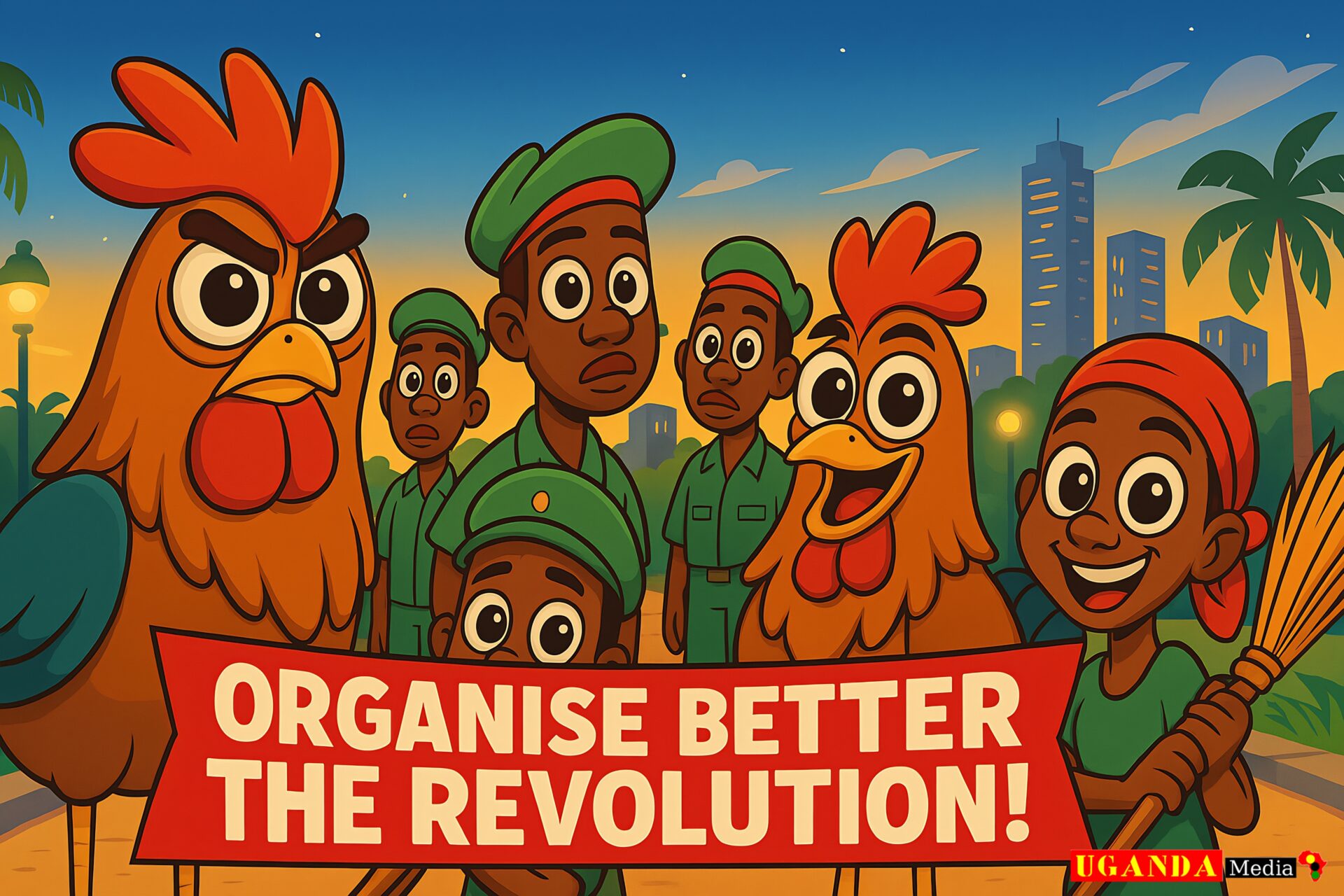
A Thought-Provoking Legacy: Decisions That Shape Destiny
In the end, the legacy of leadership hinges not on eloquence but on impact. By fostering accountability, embracing collaboration, and prioritizing the common good, Uganda can navigate its turbulent waters toward calmer shores. Whether it seizes this opportunity remains uncertain—but one thing is certain: The people demand nothing less.
For in the pursuit of progress, every decision shapes destiny. And somewhere in the middle, the heart of Uganda beats on, resilient and defiant. As Hon. Ssewungu aptly reminded his colleagues, “You will be doing your work if you point out the gaps and advise the Government accordingly.” His words hung heavy in the air, challenging everyone present—and absent—to rise above partisanship and prioritize the greater good.
These questions linger, inviting us all to engage, reflect, and act. For in the pursuit of progress, every voice matters—and every decision shapes the destiny of a nation.

